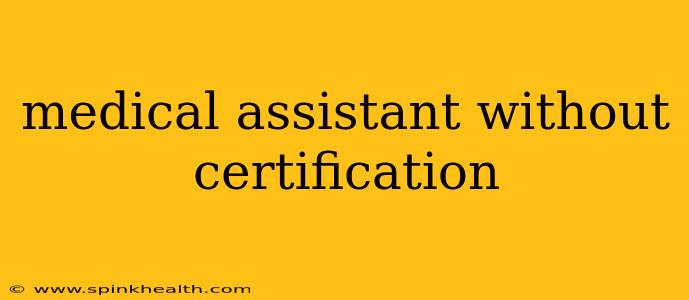Navigating the Path: Can You Work as a Medical Assistant Without Certification?
The world of healthcare is constantly evolving, and with it, the roles and responsibilities of medical professionals. One question that frequently pops up, especially for those aspiring to enter the field, is: can you actually work as a medical assistant without certification? The short answer is: it’s complicated. Let's unravel this together.
My journey into researching this topic began with a conversation with a friend considering a career change. She was drawn to the fast-paced, people-oriented nature of medical assisting but was hesitant about the commitment of formal certification. This sparked my interest, and I decided to delve deeper into the realities of this career path.
What Does a Medical Assistant Do?
Before we address the certification question, let's clarify what a medical assistant (MA) actually does. MAs are the backbone of many healthcare settings, performing a wide variety of tasks that directly impact patient care. These include:
- Clinical duties: Taking vital signs, drawing blood, administering injections, preparing patients for examinations, assisting with minor procedures, and more.
- Administrative tasks: Scheduling appointments, managing patient records, handling insurance claims, answering phones, and maintaining the overall organization of the clinic or office.
The specifics of the job will naturally vary depending on the employer and the healthcare setting (clinic, hospital, doctor's office, etc.).
Why is Certification Important?
The medical field prioritizes patient safety and accuracy above all else. Certification demonstrates that an MA has received the necessary training and possesses the knowledge and skills to perform their duties competently and safely. Certified MAs generally:
- Possess a broader range of skills: Formal programs provide comprehensive training, going beyond the basics.
- Are more employable: Many employers prefer or require certified MAs, significantly increasing job opportunities.
- Have access to professional development: Certification often opens doors to further education and career advancement.
- Enhance patient trust and confidence: Certification signifies a commitment to professionalism and expertise.
Can You Work as a Medical Assistant Without Certification?
While it's possible to find employment in some settings without certification, it's significantly more challenging. Here's what you need to consider:
- Limited job opportunities: Uncertified MAs might find themselves limited to entry-level positions with fewer responsibilities and lower pay.
- Increased competition: Certified MAs have a competitive edge, making it harder for uncertified individuals to secure jobs.
- Higher risk of errors: Without formal training, the risk of making mistakes that could jeopardize patient safety is increased.
- Potential for legal complications: In some jurisdictions, performing certain medical procedures without proper certification could have legal consequences.
What are the Alternatives to Formal Certification?
There are some pathways that may lead to work in a medical setting without traditional MA certification:
- On-the-job training: Some practices might offer on-the-job training, but this usually comes with limitations in terms of scope and career advancement.
- Other healthcare roles: Exploring related roles like patient care technicians or medical secretaries might offer entry points into the healthcare field.
How Long Does it Take to Become a Certified Medical Assistant?
The time commitment for certification varies, but generally ranges from a few months to a year, depending on the program and whether it's offered full-time or part-time. Many programs offer flexible scheduling to accommodate various learning styles and commitments.
What are the different types of medical assistant certifications?
The most commonly sought-after certifications are awarded by the American Association of Medical Assistants (AAMA) and the American Medical Technologists (AMT). These certifications demonstrate competency in both administrative and clinical duties.
In conclusion, while technically possible, working as a medical assistant without certification presents significant challenges and limitations. The benefits of pursuing formal certification outweigh the drawbacks, offering a more secure and fulfilling career path in a field where expertise and professionalism are paramount. The extra effort is well worth the investment in your future.

